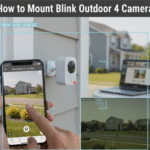The serious legal and privacy issues are posed by the use of hidden cameras, particularly in the UK, because there are stringent laws with regard to the monitoring of people, as well as the collection of their personal information. Whether you contemplate installing a concealed camera either at home or in a business setting, you must follow up on when they are welcomed and when not.
The usage of a hidden camera in the UK is made legal based on how, where, and why executed. As much as some of the uses are okay, like when you want to take care of your own security within your own home, others might infringe privacy laws thus must be handled in a particular manner.
The following article expounds on the most important regulations regarding the use of concealed cameras in the UK, such as where these hidden cameras can be used, what the law states about recording other people, and what practices you need to take in order to remain on the right side of the law. It gives you a glimpse of the importance of knowing these regulations so you can be clear of legal implications, and in case you are using the camera responsibly.
The Role of Privacy Laws in Hidden Camera Usage
Using hidden cameras in the UK is legal in some cases, but privacy laws define how and where they can be used. Below are key legal areas that affect hidden camera use:
1. Data Protection Act 2018
If a hidden camera records footage that identifies individuals, it may fall under the Data Protection Act. This law requires that personal data is collected fairly, stored securely, and not misused. Businesses especially must follow strict data handling rules.
2. Human Rights Act 1998
Everyone has a legal right to privacy under this act. Installing hidden cameras where people expect privacy, like bathrooms or bedrooms, may violate these rights and result in legal consequences.
3. Consent and Reasonable Expectation of Privacy
In private settings, recording someone without their knowledge is generally illegal. Hidden cameras should not be used in spaces where individuals expect personal privacy.
4. Use in Public vs. Private Spaces
Hidden cameras are more acceptable in public areas if used for legitimate purposes, like security. However, even then, signs or notices may be required to inform people about recording.
5. Home Use and Neighbor Rights
When used at home, cameras must not point into neighbors’ windows or private areas. Doing so may be considered harassment or invasion of privacy.
Where Can You Legally Use Hidden Cameras in the UK?
In the UK, hidden cameras can be used legally in specific situations, but the location and purpose of recording are key factors. You are generally allowed to install hidden cameras inside your own home for security or personal safety, as long as they are not placed in areas where people expect privacy, such as bathrooms or guest bedrooms.
In public or shared spaces, such as a shop or office, hidden cameras can be used if there is a clear, lawful reason—like preventing theft or protecting staff. However, the public or employees must usually be informed through signs or policies, unless there’s a strong justification for not doing so.
Hidden cameras are not allowed in places where privacy is expected, such as changing rooms, hotel rooms, or private rented spaces without the tenant’s consent. Using hidden cameras in such places can lead to serious legal consequences, including fines or criminal charges.
It is essential to determine whether the hidden camera is necessary or it can be possible to do the same with less invasive technique. Adherence to legal guidelines will keep you out of trouble and you do not end up infringing on the privacy right of anybody.
A Look at Hidden Cameras in the Workplace
Using hidden cameras in the workplace is a sensitive issue in the UK and is strictly governed by privacy and employment laws. Employers may install surveillance cameras for reasons such as protecting property, ensuring staff safety, or monitoring misconduct. However, using hidden cameras without informing employees can be legally risky and may breach their right to privacy under the Human Rights Act 1998 and the Data Protection Act 2018.
Generally, employees should be informed if monitoring is taking place. Hidden cameras can only be used without notice in exceptional situations, such as when there is a serious suspicion of criminal activity and no other method of investigation is effective. Even in these cases, the use must be proportionate, time-limited, and justified with documented reasons.
The security camera should never be installed in such privacy areas as toilets, changers or break rooms. Private information gathered by the surveillance should be stored in a safe with limited use and should be removed when not required, and with the aim of its intended purpose.

Hidden Cameras in Domestic Settings: What You Need to Know
Although observers are not allowed to record things with the help of a so-called nanny cam in your own house in the UK, it is mostly legal, at least when it comes to protecting your property or keeping an eye on the safety of your family members or close ones. There is no need to obtain authorization to record in your house. The law, however, is stricter when it involves other parties.
If you have guests, lodgers, or domestic workers (like cleaners or carers) in your home, their right to privacy must be respected. Hidden cameras should not be placed in private areas such as bathrooms, guest bedrooms, or anywhere someone might reasonably expect privacy.
Recording others without their knowledge, especially for reasons beyond security, may violate the Human Rights Act 1998 or the Data Protection Act 2018 if the footage is stored or shared.
If you’re hiring professional care in your home, it’s best to inform them of any cameras, even if not legally required. Being transparent reduces the risk of legal issues and helps maintain trust.
Hidden camera use in domestic settings must be reasonable, necessary, and respectful of privacy. Misuse could lead to complaints, loss of evidence in legal disputes, or even criminal charges if laws are broken.
How the GDPR Affects Hidden Camera Legality
The General Data Protection Regulation (GDPR) plays an important role in the legality of hidden cameras in the UK, especially when the cameras record individuals who can be identified. If you record, store, or share footage that includes people, this is considered processing personal data, and GDPR rules apply.
Under GDPR, anyone collecting personal data must have a clear and lawful reason, and the data must be used fairly, securely, and only for its intended purpose. In the context of hidden cameras, this means you must be able to justify why the recording was necessary and proportionate.
If you use hidden cameras for business or public purposes, such as in a workplace or shop, GDPR requires that you inform people where possible, document your reasons, and ensure the data is stored safely. If individuals request access to footage of themselves, you are legally required to provide it.
For domestic use, such as protecting your home, GDPR typically doesn’t apply unless you record beyond your property boundaries (like filming a public street or neighbour’s home).
Failing to follow GDPR rules can lead to complaints, investigations, and financial penalties from the Information Commissioner’s Office (ICO).
The Consequences of Illegal Hidden Camera Use
Using hidden cameras illegally in the UK can lead to serious consequences. If you record someone without their knowledge in a private space where they expect privacy—such as a bathroom, bedroom, or changing room—you may be violating the Human Rights Act 1998 or Data Protection Act 2018. In cases involving misuse of personal data, the Information Commissioner’s Office (ICO) can investigate and issue fines.
If the hidden camera use is considered harassment, stalking, or voyeurism, you could face criminal charges, including fines, a criminal record, or even imprisonment, depending on the severity of the case. For businesses, unlawful monitoring of employees can lead to legal disputes, reputational damage, and financial penalties.
Ethical Considerations When Using Hidden Cameras
In addition to the application of the rule of law, there exist certain ethical issues relating to the usage of hidden cameras. Sometimes it does not imply that the recordings that are legal are morally acceptable either. It should be noted that installing a hidden camera should be done with consideration of how it would impact the trust, dignity and right to privacy of other people.
One key ethical consideration is consent. Recording someone without their knowledge can feel like a violation, even if done for security reasons. In workplaces or shared living spaces, transparency is usually the better approach to avoid damaging relationships or morale.
You should also consider intent. If the camera is being used to gather evidence of wrongdoing or protect safety, it may be more justifiable. However, using hidden cameras to spy, control, or monitor people without a valid reason is unethical and can harm your reputation and credibility.
Placement is another factor. Installing cameras in private areas like bedrooms or bathrooms is almost always considered unethical, even if technically legal in some personal situations.
Wrapping Up
There is both a legal and a moral responsibility in using concealed cameras in the UK. Although these devices may have some good reasons to be applied, including them in home security or guarding the premises of the business, they should be employed in the framework of the current privacy laws, like the Data Protection Act, the Human Rights Act, and the GDPR.
We must also take into account how the usage of such hidden cameras can impact the level of trust and comfort of those under the camera. In any situation, be it in your home, workplace or in the streets, kindly ask yourself the following questions: is it necessary to make such a recording, is it proportional, and are you respecting the rights of other people? The legal aspects of such misuse can be quite relevant in case of fines or even criminaladequacy. Ethics of use means considerate intention, right location, and safe processing of any recorded data. Being responsive and informed is the best strategy to safeguard both interests and the rights of other people.
FAQ’s
Is it illegal to film a child without consent in the UK?
Filming a child without parental consent may breach privacy laws, especially in private settings. In public, it’s not always illegal but should be done respectfully.
Can I take pictures of a military base in the UK?
Taking photos of military bases is restricted under the Official Secrets Act. Doing so without permission can be considered a security risk and may lead to legal action.
Can you film in a supermarket in the UK?
Supermarkets are private property. Filming without permission is not allowed and staff can ask you to stop or leave. Always get consent from the store management first.











